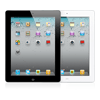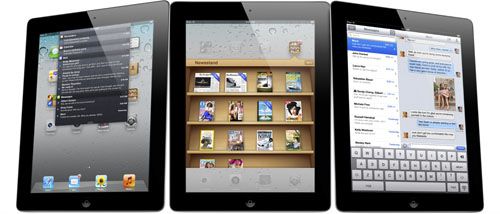- Qualcomm Launches Snapdragon 4 Gen 2 Mobile Platform
- AMD Launches Ryzen PRO 7000 Series Mobile & Desktop Platform
- Intel Launches Sleek Single-Slot Arc Pro A60 Workstation Graphics Card
- NVIDIA Announces Latest Ada Lovelace Additions: GeForce RTX 4060 Ti & RTX 4060
- Maxon Redshift With AMD Radeon GPU Rendering Support Now Available
Should Tablets and Smartphones be Considered “PCs”?

A new debate’s upon us! No one would argue the fact that smartphones, tablets and similar devices are “computers”, but would it be appropriate to label the same devices “PCs”? With an analyst firm doing just that recently, we’ve decided to take a look at multiple factors to see if such a classification is a good or bad thing.
Interest has been waning for a while in the ‘Mac vs. PC’ debate, so shall we usher in a new one together? At the moment, I can’t think of a better topic to discuss than what the title of this article suggests: Is a tablet a PC?
That seems like a simple question, and it is, but the “right” answer could either propel Apple into becoming the largest “PC” vendor on the planet, or keep it right where it is – still lagging behind Windows.
As far as research firm Canalys is concerned, tablets are in fact PCs. In a press release issued earlier this week, the firm touts the fact that Apple is on track to become the leading global PC vendor before the second-half of 2012, thanks entirely to its iPad shipments.
The release also states that Apple’s total PC marketshare increased from 9% to 15% in the previous four quarters, and though the iPad faces stiff competition with the introduction of budget tablets (Amazon’s Kindle Fire and Barnes & Nobel’s Nook Tablet), Canalys believes that with the iPad 3’s launch, Apple will replace HP as the leading global PC vendor.

Is Apple’s iPad, in effect, a PC?
I have little doubt that Apple’s iPad will remain the most popular tablet choice for some time to come, but this release which treats tablets as PCs is a little questionable. First, Canalys doesn’t refer to tablets as “tablets”, but rather “pads” – a term that virtually no one uses. Even ASUS refers to its Eee Pad as a tablet. Googling the word ‘pad’ vs. ‘tablet’ further proves that the latter is in fact the proper term. Yet, based on the iPad, Canalys refers to all tablets as pads. You would have imagined that a firm like this could have spent one minute researching the proper term.
Second, what makes a tablet a PC that doesn’t make a smartphone one? The iPad runs Apple’s iOS just as iPhones do, and for the most part, the hardware shared between each is near-identical as are their capabilities. Much of the same can be said about Android tablets. Once ‘Ice Cream Sandwich’ hits, the OS on Android-based tablets and smartphones will be 1:1.
Are smartphones not considered PCs due to their screen size alone? I don’t think it can be that simple. Netbooks have been defined as “small laptops”, but those are still considered to be PCs. With Canalys’ having grouped tablets and PCs into the same group, it’s clear that it’s the capabilities that are possible on a tablet that make it a PC. And with that logic, as a smartphone can do anything a tablet can, albeit with a smaller screen, it’s also a PC.
Countering this argument, what would make a tablet not be considered a PC? Since the 70s, “PC” has stood for “personal computer”, although since then, it feels as though the term has become its own word – one used to describe a desktop or notebook computer. But Wikipedia defines a personal computer as this:
“A personal computer (PC) is any general-purpose computer whose size, capabilities, and original sales price make it useful for individuals, and which is intended to be operated directly by an end-user with no intervening computer operator.“

How much does a tablet have in common with this?
On a tablet, people can do their work (e-mail, edit documents), consume media (listen to music, watch video, browse the Web), install a multitude of different apps and configure the OS to their liking. The OS itself isn’t what matters. Scaled-down or not, it will still allow people to do common tasks.
If I changed the word “tablet” at the start of that paragraph to “desktop”, the entirety of it would still fit.
With that, it’s difficult to not classify a tablet as being a PC. But at the same time, tablets and traditional desktops and notebooks don’t share the same goals. No one picks up a tablet with the intention to use it as a desktop replacement (but if so, kudos) because they are inherently much simpler devices, both in hardware and in the robustness of the available applications.
That’s not to say that a regular computer user couldn’t do most everything they need to on a tablet. But due to its limitations, working or playing on a tablet isn’t as efficient as working on a desktop or notebook. With devices such as ASUS’ Transformer which can use an add-on keyboard, certain tasks are made easier, but that doesn’t remedy the fact that mobile OSes are not as full-featured as desktop OSes, with the same being able to be said about available apps.
Still, none of that discredits the fact that tablets are PCs, and as touched on earlier, the above-mentioned facts make smartphones just as much a PC as tablets.
Another thing to consider is that tablets are far from being a new invention. There have long been handheld tablets like we see today that have been designed to run Windows and Unix, though up to this point those haven’t had much of a consumer focus, but rather better-suited businesspeople, such as architects, warehouse workers, traveling vendors and so forth. Long before the iPad, though, it wouldn’t have been hard to classify a Windows tablet as a “PC”, would it?
This all said, while tablets and smartphones can be considered PCs, I don’t believe their sales or successes should be lumped into one overarching statistic. A tablet might be a PC, but that doesn’t make them the same in terms of their goals and capabilities. Doing so would make as much sense as comparing Ferrari’s sales to Toyota’s to deem which one produces the more impressive car.
In effect, the benefit of being able to follow trends would be made complicated when treating tablets as desktops and notebooks, and as such, each category of PC should be treated by itself.
Of course, it’s important to note that Canalys is just one research firm that has clumped tablets into the same category as PCs, so time will tell if others are going to follow suit. It might be that no one else agrees with the firm’s logic. Until then, what are your thoughts on the ‘Tablet vs. PC’ debate?
Discuss this article in our forums!
Have a comment you wish to make on this article? Recommendations? Criticism? Feel free to head over to our related thread and put your words to our virtual paper! There is no requirement to register in order to respond to these threads, but it sure doesn’t hurt!
Support our efforts! With ad revenue at an all-time low for written websites, we're relying more than ever on reader support to help us continue putting so much effort into this type of content. You can support us by becoming a Patron, or by using our Amazon shopping affiliate links listed through our articles. Thanks for your support!





